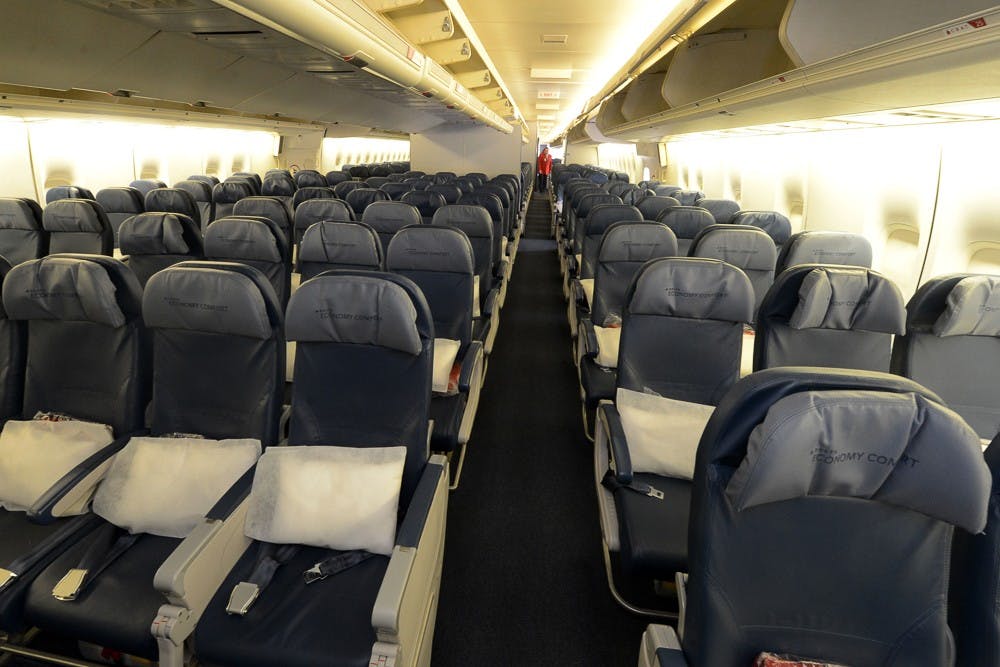If you’ve got a big booty, or broad shoulders, you might start giving particular airlines the boot. A lot of people already complain about the tight spaces they’re squeezed into during flights, some of which last 10 or more hours — but it could get worse. There has long been debate over “the Knee Defender” or “ the Right to Recline vs. the Right to Defend Against Recliners” as Bill McGee says for USA Today, but now not only could passengers be forced to squish themselves vertically but width wise as well.
Clearly, Airbus has a completely different idea when it comes to comfort, or maybe it just has no idea what comfort means. At the Aircraft Interiors Expo 2015, it released a mock cabin of the new Airbus A380 which is going to wedge another person into the middle row, resulting in a “3-5-3” configuration, or 11 seats across rather than 10.
Although the seats will still be the 18 inches that they have been, you have to consider squeezing an extra seat into a cabin that isn’t that much larger. When the “the average human shoulder width is about 16 in. (41 cm.)” as Time reports, the amount of wiggle room is scarce, especially once you consider the fact that people sitting next to you are rarely the same size. Plus, the most common airlines using the Airbus A380 to service their customers are Emirates, Singapore Airlines, Lufthansa and Qantas, which is even more unfortunate considering they mainly make international flights.

For travelers, this is yet another disappointment. Seats have been shrinking over the years despite complaints from travelers that don’t quite fit the ideal mold for comfortably fitting into an airplane seat. USA Today cites data from Seatguru.com showing how American Airlines, Delta, United and Southwest, have all dropped at least 2 inches in width between 1985 — kind of ironic, considering the average physical size of people around the world is continually increasing.
Not to mention, while airlines continually shrink seat sizes, they’re shrinking our wallets as well. Bill Saporito for Time says, “When oil was soaring, the airlines were losing billions and eventually were driven into bankruptcy. They have emerged, recapitalized and rationalized: They can make money even with much higher fuel costs. But they can make a lot more money with lower fuel costs as well as by raising prices. There is no reason not to do both.”
The worst part is that unfortunately for most of us, who have to fly on a regular basis or for those who simply love traveling, we’re going to have to fork up the extra money for less space in most cases. However, we can be a little smarter about choosing airlines in order to end up in the best situation. Take Southwest, for example: Flying Southwest as of 2016 will mean possibly avoiding up-charges, such as baggage fees, and more comfort. “The carrier is adding almost an inch of width to the seats on its 737 planes. According to Southwest, the new 17.8-inch wide seats will be the widest 737 seat of any U.S. airline,” Brad Tuttle for Money said. This comes as a relief for someone who is a frequent cross-country flier — extra space is always welcome.
Despite the fact that the majority of airline companies are becoming more and more ridiculous, maybe patronizing the few that seem to be making the more comfortable moves, like Southwest, might make other companies flock towards the same strategy.
Reach the columnist at Kayla.Chan@asu.edu or follow @KaylaRC2014 on Twitter.
Like The State Press on Facebook and follow @statepress on Twitter.
Editor’s note: The opinions presented in this column are the author’s and do not imply any endorsement from The State Press or its editors.
Want to join the conversation? Send an email to opiniondesk.statepress@gmail.com. Keep letters under 300 words and be sure to include your university affiliation. Anonymity will not be granted.




